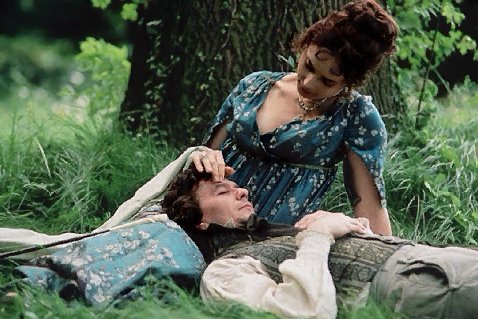|







 
|
 |
Immortal Beloved (1994)
    

|
Director:
Bernard
Rose |
COUNTRY
USA |
GENRE
Biography/Drama |
NORWEGIAN TITLE
Min
udødelige kjærlighet |
RUNNING
TIME
121
minuted |
|
Producer:
Bruce
Davey |
Screenwriter:
Bernard Rose |
Review
Seen at face value, with no regard to
the historical context, this Bernard Rose film about the latter life of
Ludwig van Beethoven is a consummate piece that includes every element
and evokes every emotion. It effectively portrays Beethoven's genius,
temper, tenderness and spitefulness, it presents some of his finest
music in a handful of incredibly emotive scenes (none better than when
an almost completely deaf Beethoven is tricked into playing the
Moonlight Sonata on a new piano), and it is cleverly built-up as a
romance mystery, told from the point of view of his secretary Anton
Schindler, who goes looking for the beneficiary of the composer's famous
unsent love letter "Immortal Beloved", which was found in his estate
after his death. Schindler's investigation takes us from one alleged
lover to the next, and along the way he and we learn about Beethoven's
tragic decline, culminating in the failed attempt at making his young
nephew Karl a famous virtuoso.
Beethoven's life was rich and eventful,
and his persona so complex and conflicting that any characterization of
him will be both highly interesting and always open to interpretation.
In the case of Immortal Beloved, however, historians and
biographers don't debate the characterization as such, but rather the
conclusions surrounding the aforementioned love letter. For
connoisseurs, the uncertainty surrounding Rose's conclusion may well
make or break a film like this, and since essentially no other
biographer agrees with Rose on these conclusions, they have every right
to claim Immortal Beloved as invalid, and thus a failure. Still,
that wouldn't do Mr. Gary Oldman justice, because his portrayal of
Beethoven is so accomplished and forceful that it brushes aside possible
inaccuracies in the plot like dust in the wind. The fact that Tom Hulce
was nominated for the Academy Award for his performance as Mozart in
Milos Forman's Amadeus
(in a fine performance indeed), whereas Oldman was overlooked for this
performance, is nothing short of a disgrace. My conclusion is that
Beethoven's life, romances and music will continue to be discussed for
centuries, but the way Rose and Oldman bring him to life here, with all
his defects and greatness, makes this film an invaluable document
nonetheless.
Re-reviewed:
Copyright © 27.12.2013 Fredrik Gunerius Fevang
Original review: Copyright © 8.5.1997 Fredrik Gunerius Fevang
|
[HAVE
YOUR SAY] |
|
|